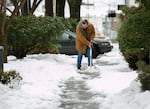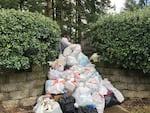
A man shovels the sidewalk on Northeast 21st Avenue near Wasco Street in Portland, on Tuesday, Feb. 16, 2021. The metro area continues to dig out following the weekend's snow and ice storms.
Kristyna Wentz-Graff / OPB
At least four people have died trying to stay warm in the aftermath of last weekend’s snow and ice storms, and close to150,000 homes and businesses were still without electricity Wednesday afternoon.
The Clackamas County Sheriff’s Office confirmed the deaths due to carbon monoxide poisoning Tuesday afternoon. Carbon monoxide is a side-effect of improvised indoor heating systems that lack adequate ventilation. Three of the deaths were a result of faulty propane heating sources in trailers, one death resulted from the use of charcoal briquets inside a home, the sheriff’s office said.
More than half a million homes and businesses have experienced power failures since Saturday and, even with much of that restored, a vast swath of the state’s residents are still navigating life without reliable electricity, as Oregon digs out from a snow and ice storm that caused the worst destruction the region’s power grid had seen in decades.
Gov. Kate Brown declared a state of emergency and on Wednesday she warned against price gouging by hotels at a time when many people are seeking heated places to stay warm and dry.
For days, residents have largely hunkered down at home, trapped by snow, ice and downed trees on the roads in the Willamette Valley, and weather-driven interstate closures to the east. Now warmer temperatures have transformed snow and ice to water and slush, prompting concerns about flooding in some areas, and Interstate 84 has reopened to most traffic in eastern Oregon. But the recovery continues.
As of mid-afternoon Wednesday, many communities and neighborhoods were still without electricity as utility companies took two steps forward and one step back in their effort to restore lost service.
“To date, we have restored 490,000 customers,” Portland General Electric CEO Maria Pope told the media. Yet more of the utility’s customers were without power as she spoke Wednesday morning than just a few hours previously, as water-logged trees continued to topple, taking with them still more power lines.
“We’ve had more outages come on as we’ve repaired past outages. Our crews are really in an ongoing repair situation and it’s going to take some time to get everybody back on,” PGE spokesman Steve Corson told OPB. “It’s still going to take a long time, so we could have people who are out for many days yet.”
Part of the challenge, Corson said, is that unlike other recent ice storms, this one had a severe impact on the utility’s transmission system, the high-power lines that feed substations that then power individual areas. More than 200 miles of transmission lines were in need of repairs, Corson said.
Pope said PGE is prioritizing repairs to distribution feeders, and is also putting public safety and infrastructure first. The utility is restoring electricity to hospitals, elder care facilities and essential utilities like water treatment plants first, where it can, then shifting to the largest groups of customers still without power.
PGE reported on its outages page that 100,117 customers were without power at 6:13 a.m. Thursday. The utility said it had thousands of workers out in the field and has called in help from across Washington, Nevada and Montana, as well as other Oregon utilities. PGE expects 90% of the remaining outages to be fixed by Friday night.
The bulk of the outages are in Marion and Clackamas counties.
Oregon City spokeswoman Kristin Brown said many large branches broke around the city, but never made it to the ground. So an untold number of limbs are still hanging in the trees, waiting for the slightest breeze to bring them down on cars, power lines or pedestrians.
“We’re having to bring in some extra equipment to reach those and bring them down safely,” she said.
Older neighborhoods were hardest hit because they tend to have older, bigger trees. At one point the entire population of Oregon City, some 37,0000 people, was out of power.
Meanwhile, Pacific Power reported 3,353 customers still in the dark as of 6:20 a.m. Thursday.
Shipping delays, power failures complicate COVID-19 vaccination push
The push to vaccinate a growing number of Oregonians against the coronavirus has also been complicated by the weather and power failures, according to officials with the Oregon Health Authority.
The agency said Tuesday that it’s reaching out to sites that have lost power to their freezers to move vaccine doses to limit spoilage. It also acknowledged that some vaccine appointments were canceled over the weekend, and said that shipments of doses may be delayed due to severe weather both in Oregon and across the U.S.
The Oregon Health Authority is encouraging people with questions about future vaccine appointments to reach out to the group they made the appointment with, or to visit the state’s COVID-19 page to get information about how each county is affected.
“We are evaluating the situation and expect to learn more in the next few days,” the agency said in a statement.
Related: Thousands contacted for vaccination rescheduling after ice storm disruptions
Spoiled food and risky home heating solutions

Residents of a West Linn apartment complex threw out mounds of food Tuesday, Feb. 16, 2021, from refrigerators unable to keep cold during power failures.
Jan Boyd
Asked by OPB to share how they’re faring in the aftermath of a series of weekend snow and ice storms, Twitter users bemoaned food supplies they had to toss after days or hours without refrigeration.
“We lost power on Friday early evening. Trees down all over. We have fireplace and wood but still very chilly inside. Freezer full of newly-purchased meat can’t be saved. Power lines down throughout the neighborhood so we know it could be another week before we get power,” Twitter user Steve Ritchie shared.
The Oregon Department of Services said people who receive SNAP food assistance, informally known as “food stamps,” can apply to have their benefits restored if they file a request within 10 days of tossing food due to the weekend’s storms.
In Portland, worry about food supplies seemed to reach a fever pitch after a power failure in Northeast Portland on Tuesday afternoon prompted a supermarket to toss food at risk of spoiling. News of dumpsters filled with discarded food spread quickly on social media, but when a crowd gathered at the Hollywood Fred Meyer store, employees attempted to turn people away and ultimately called the police. For about an hour, police officers engaged with a crowd of 50 or so people seeking to access the food.
The Portland Police Bureau issued a statement Wednesday, saying their presence at the supermarket was to “preserve peace, prevent violence, and restore order.” Later, after officers left the area, some people in the crowd returned to the dumpster to retrieve food items.
Kroger, the corporation that owns Fred Meyer stores, issued its own statement Wednesday, apologizing for the confrontation.
“Our store team became concerned that area residents would consume the food and risk foodborne illness, and they engaged local law enforcement out of an abundance of caution. We apologize for the confusion,” Kroger stated via its social media accounts.
Related: How people are managing without power
Other OPB followers online shared stories of creative efforts to stay warm indoors with propane heaters or gas-fueled stoves, raising concerns from the Oregon Department of Emergency Management. These approaches may seem like a good solution, but in addition to releasing heat, unvented stoves and heaters can release deadly carbon monoxide, which kills people every year.
“Loss of power and freezing temperatures have some Oregonians using alternate heating sources, many of which come with the added risk of carbon monoxide poisoning,” the agency cautioned in a press release.
Storm resources
Stay warm: 211info.org maintains an updated list of warming shelters across Oregon, including hours of operation and eligibility.
Replacement benefits: People who receive SNAP food benefits and lost purchased food due to power outages can apply to have their benefits restored by the Oregon Department of Human Services. People must request replacement benefits within 10 days of food loss.
Know before you go: The Oregon Department of Transportation’s Tripcheck.com map features road camera, road closure information and traffic conditions on state-operated roads (think: highways) across the state. The Washington State Department of Transportation offers a similar map with travel alerts across the state.
Prepare before you travel: ODOT also provides a helpful list of tips to keep in mind before setting out for winter travel.
Check your list: The Washington State Department of Transportation has some helpful checklists for winter driving, including what to carry in your car.
Watch the plows: For Portland residents, the Portland Bureau of Transportation has a live map that shows where the city’s snowplows are in real-time.
